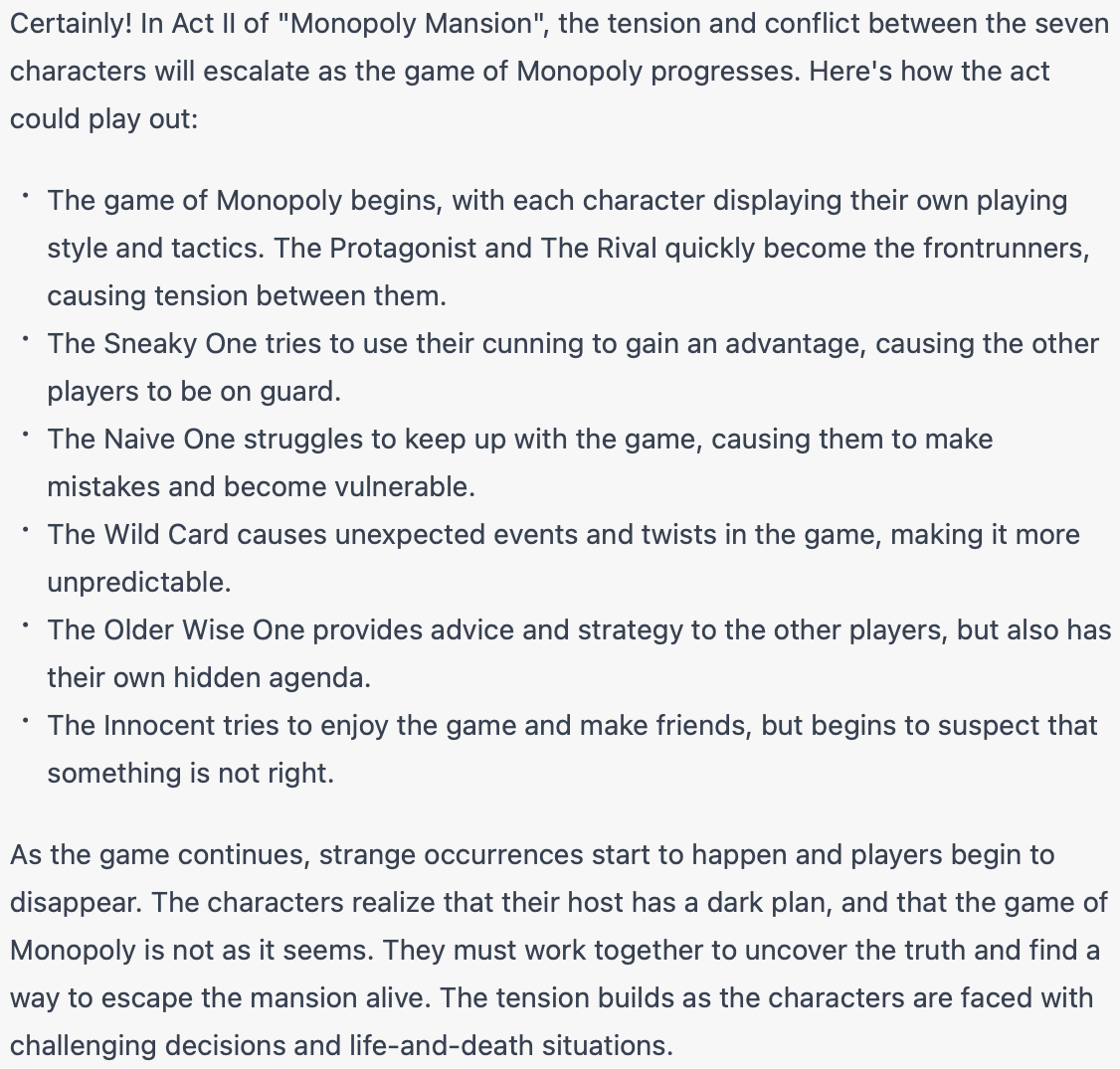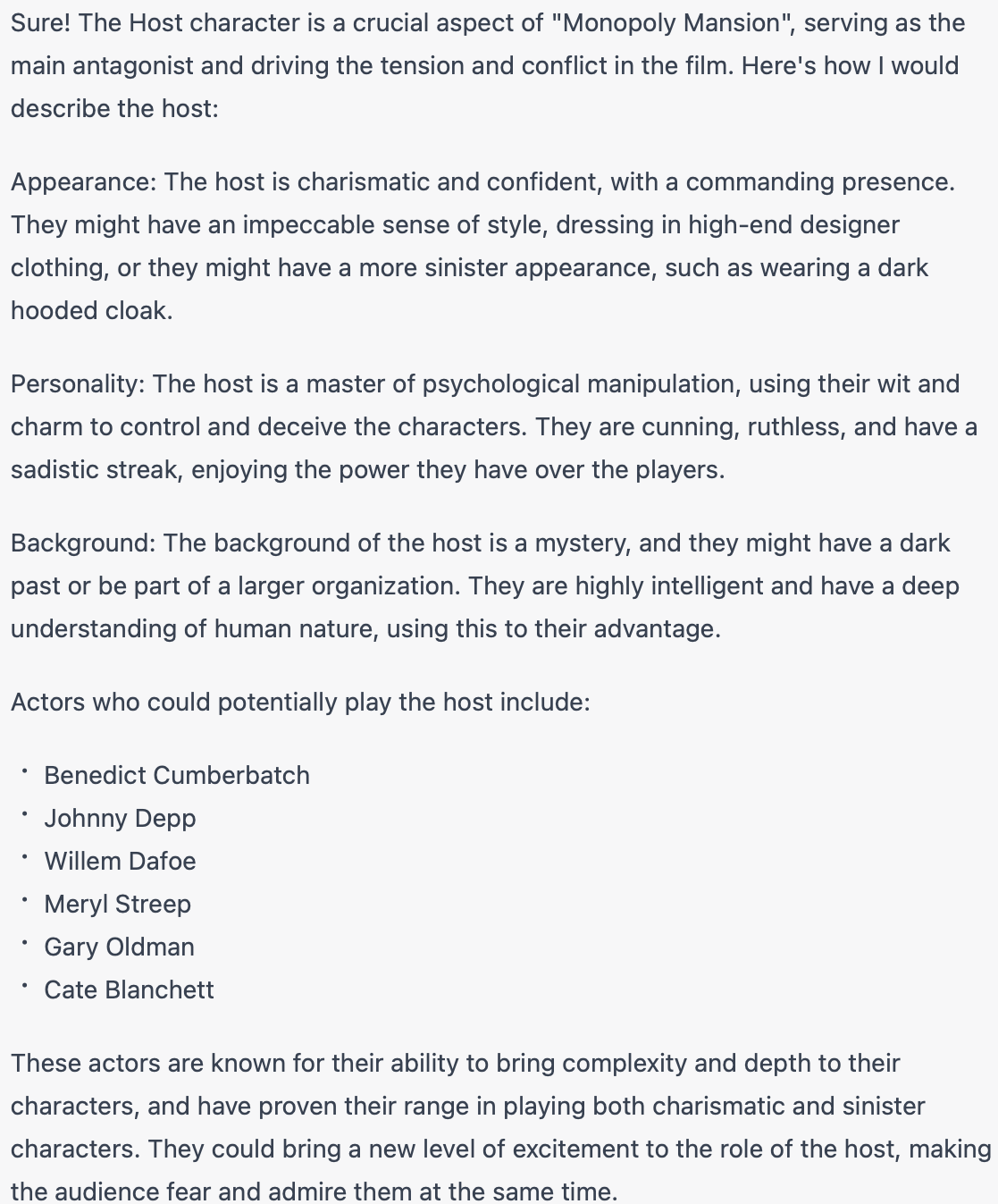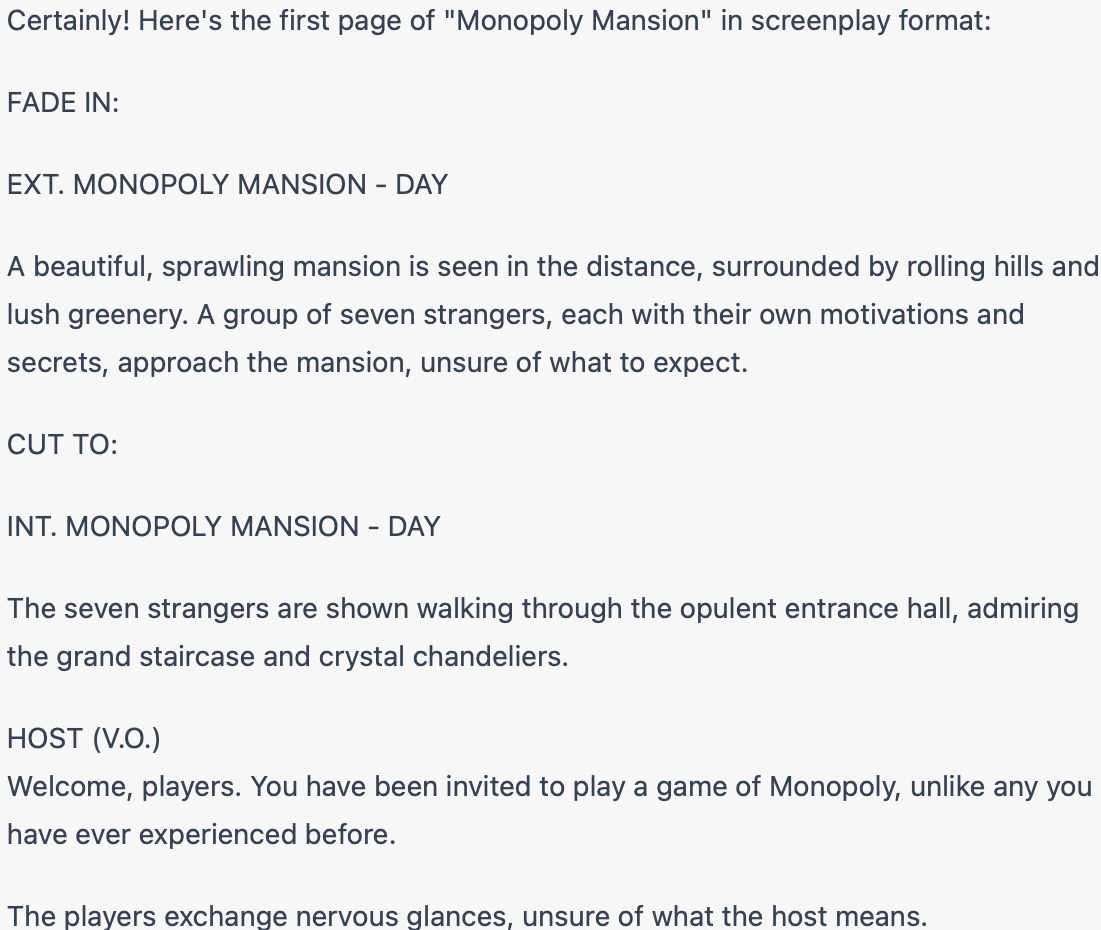I used ChatGPT to outline a movie in 20 minutes.
What's stopping a studio from doing the same?
Two weeks ago, when writers were upset about OpenAI’s ChatGPT-3, I laughed at them. I tweeted how I wasn’t worried about AI writing: “My writing is so idiosyncratic; I’d love to see a robot EVEN TRY to duplicate me.”
But then I actually used ChatGPT. And I deleted the tweet. Sure, a robot isn’t going to replicate me anytime soon. But, the results were still troubling.
Last year, when OpenAI’s DALL-E, an AI-generating image software, launched, I had mixed emotions. On the one hand, it was sort of interesting and fun to play with. But I also felt dread. I’ve employed several visual designers for my creature features, and this felt like a betrayal. I had to draw a line in the sand. I put DALL-E out to pasture.
But Lord knows the entertainment industry is built on lesser morals.
Exhibit A/B/C/D:
Netflix Faces Backlash After Using AI Software To Create Backgrounds For An Animated Short
BuzzFeed says it will use AI to help create content, stock jumps 150%
Sports Illustrated Publisher Taps AI to Generate Articles, Story Ideas
Artificial Intelligence Creates ‘Seinfeld’ Streaming Spinoff ‘Nothing, Forever’ On Twitch
* These headlines are all within the last week or so.
EXHIBIT E:
I logged into ChatGPT-3 and decided to use it for something familiar among writers in Hollywood - pitching on IP.
What I wrote to ChatGPT is bolded:
Write me six movie concepts based on the monopoly board game.
Instantly I was sent this:
Let’s see how deep we can go.
Can you expand on the three-act structure of "Monopoly Mansion"?
Could you expand on the characters in act one? How many characters could it be? What possible motivations and secrets could they have?
Could you give me an opening line of dialogue for each one of those seven characters you just created?
Could you expand upon act two using these seven characters?
Can you expand upon act three using these same seven characters?
Can you detail what challenges and obstacles the characters might face?
Can you expand upon the third act climax "twist"?
Can you describe the host character in detail? What actors could play him or her?
Could you write the first page of this movie in screenplay format?
SO…
If you have the patience to expand and pick apart everything ChatGPT says, you can generate quite a lot of material. Also, everything ChatGPT can be challenged. Don't like the characters? Just tell it to regenerate more.
Notice I didn't "feed the AI" anything creative. Some people are under the impression that as long as you don't feed the AI something creative, it'll be unable to come up with anything. But imagine if I used 5% of my creative brain and spent more than 20 minutes working with chatGPT. What sort of outline could I generate?
WHAT DOES THIS MEAN FOR SCREENWRITERS RIGHT NOW?
This could eliminate the concept of pitching for a job. Or, at the very least, eliminate studios paying for treatments or outlines.
Let’s say the studio has AI generate an outline with the help of a producer or executive. “I need 10 concepts for the slinky movie on my desk by Tuesday!”
The studio then brings in an already-established writer to create a screenplay based on their AI-generated outline.
In this scenario, the studio no longer has to pay for treatments or outlines.
Young writers wouldn’t be given a shot to pitch on something because the AI already figured it out. Which means new writers won’t be in the room anymore. Executives won’t be able to say, “We’re not going with their pitch, but I like them for something else.”
WHAT DOES THIS MEAN FOR SCREENWRITERS A YEAR FROM NOW?
Let’s say you don’t care about outlines or story treatments. Who cares if people no longer pay for that? Let a robot figure it out and just pay me to write the screenplay, man.
But who's to say how good AI will be in a year? Do you honestly think an entirely AI-generated screenplay won’t ever exist?
Sure. It’ll probably suck and be formulaic.
But here's the rub.
Couldn’t studios hire screenwriters to rewrite that sucky robot draft? And wouldn’t that qualify the work as a “re-write,” meaning the screenwriter would make less money? Freelancers in publishing are already taking lower-paying jobs to “polish up” AI.
And here’s another crazy-making thought. What if you were hired to write a screenplay for a studio, and that studio decided to use AI to generate its sequels? Or, at the very least, an outline for you to then do a rewrite on?
But, hey, don’t worry because this is just a fad. And besides, I’m sure someone has our backs. I mean, OpenAI must be considered a terrorist organization by this point!
Just kidding.
Instead of technology companies pumping the brakes and asking how this might affect the livelihood of artists, they’re doubling down. The New York Times is calling it an “A.I. Arms Race.”
Microsoft spent 10 billion dollars to acquire OpenAI. (They laid off 10,000 employees immediately afterward.) And Google just poured 300 million into a competing AI company.
Google is set to release their bot in “the coming weeks” and plans to allow developers to use it too.
AND IF YOU THINK THE PUBLIC WILL SAVE US
They're not. They think AI is cool. (Kids can cheat on their English essays!) And it's free and fun. And boy, is it POPULAR. ChatGPT reached over 100 million users in January. Its growth rate is faster than TikTok or any other popular app or service.
Speaking of, every time a new person interacts with ChatGPT it becomes smarter:
Do you use our conversations to enhance your intelligence?
Again. Let me be clear. I don’t believe a robot will write the next Oscar-winning screenplay. (And they definitely aren’t gonna write the next fucking The Cleanse, am I right, folks?)
This will be true for quite some time. And thank God, because honestly, I have enough shit to worry about.
But two things can be true!
I believe no robot will ever be as unique and specific as my writing. True.
But can AI be used to slowly, methodically eliminate lower-level jobs, especially jobs that help support families or allow new writers to break into the industry?
(SHRUG EMOJI)
A RECAP OF THE VISUAL ARTS
Here’s an AI-generated prompt, June 2022:
7 months later:
That’s quite an improvement in 7 months.
Also, I forgot to mention:
ChatGPT-3 is based on 2-year-old technology. Its success was a fluke, rushed to market by OpenAI in hopes of beating competitors. ChatGPT-4, set to release later this year, is rumored to include 100 trillion parameters — nearly 600 times as many as GPT-3.
If Visual Arts AI could do that in 7 months…
That brings me to what Netflix Japan tweeted last week:

So…Studios are already starting to “experiment” with AI-generated artwork. How soon will they “experiment” with writing? Also, I LOVE the use of “experiment” in this tweet. This is exactly how studios will normalize this. “Don’t worry, you guys. This is just an experiment.”
IN CONCLUSION
The Writers Guild has something in their contract that suggests work needs to be done by a human being, but it could use some clarification now that we live in the very real world of AI. Studios feeding work (they paid you for) into AI is another question. It's such an unheard-of idea six months ago that I can't see it being covered in a WGA agreement.
As mentioned before, ChatGTP is a legal nightmare. It’s made of written human work that its software creators have no control over. (And we know how that went for Napster.) The HOPE is no studio would use software like this. Last week, a class action lawsuit was filed against image-creating AI software.
OpenAI wasn’t one of them, but you figure something has to be coming in the legal world to regulate this, right?
Right?















